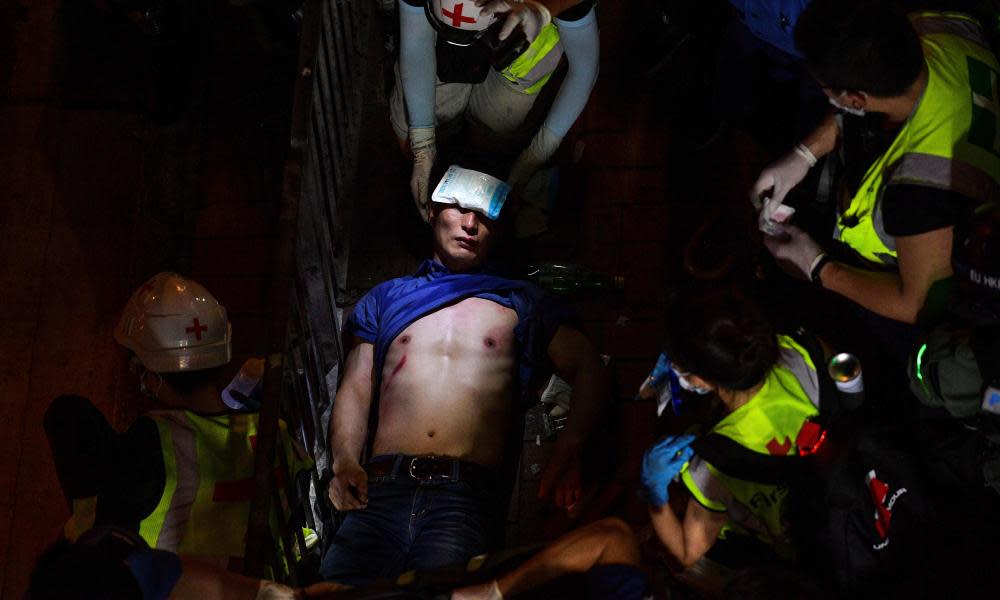Photo exhibition featuring Hong Kong protest images shut down in Macau

A prestigious international press exhibition, featuring photographs of the Hong Kong protests, has been abruptly taken down in Macau, with organisers refusing to explain why, prompting speculation of political pressure.
The World Press Photo exhibition opened on 25 September and was scheduled to run until 18 October but was closed early. Local media quoted the government-run Macau Foundation denying any political pressure, and an organiser told local radio it was due to “internal management problems”, but declined to elaborate.
The exhibition featured images of the Hong Kong pro-democracy protests which wracked the city through much of last year, taken by AFP photographer Nicolas Asfoiuri. The content of the exhibition – chosen by a jury from thousands of global photojournalism submissions – remains the same in every country it is displayed.
Related: Hong Kong primary teacher deregistered 'for talking about independence'
The World Press Photo Foundation, based in the Netherlands, said it hadn’t been able to confirm the reason for the Macau exhibit’s closure.
“While the reasons for the closing remain unclear, we are following local media reports suggesting that it might be the result of external pressure on the content of the exhibition,” said the foundation’s director of exhibitions, Laurens Korteweg.
“Supporting the conditions for freedom of expression, freedom of inquiry, freedom of the press is a fundamental part of our work. We regret the premature closing of our annual exhibition in Macao. Our collaboration with the Association Casa de Portugal Macao has always been a positive one and we hope to be able to come back to Macao.”
The Macau Portuguese and English Press Association said if the closure was due to pressure over any included photographs they would consider it “a serious and worrying incident that signals an erosion of freedom of expression”.
Related: Hong Kong security law 'may break international laws'
Macau, like Hong Kong, lives under the “One Country Two Systems” principle, but has not seen a pro-democracy movement like Hong Kong. Earlier this year it banned the display of a photo exhibition commemorating the 1989 Tiananmen Square massacre.
In June Beijing implemented a sweeping national security law on Hong Kong, which broadly outlined acts it considered to be secession, sedition, foreign collusion or terrorism. The wording of the law extended its jurisdiction globally, and human rights and legal experts have expressed concern that it could be used to persecute pro-democracy figures abroad, and to crush dissent and freedom of speech in places like Macau.
This week it was revealed a Hong Kong primary school teacher had been deregistered for showing students materials from the pro-democracy movement to teach them about freedom of speech. The secretary for education, Kevin Yeung, said the incident happened prior to the introduction of the national security law, but for future cases they would consult with law enforcement agencies. The bureau said it would work to find other “black sheep” accused of professional misconduct.
Related: Pro-democracy leader Joshua Wong arrested in Hong Kong
More than 20,000 schoolteachers, students and parents have lobbied the government in protest of the firing.
While the Hong Kong government sought to reassure residents that the national security law was aimed only at a small group of criminals, it has had an alarming impact on Hong Kong’s media, education, and academic sectors, and has targeted even benign forms of activism. Successive police operations have also arrested at least 28 people under the law, although only one has been charged.
The crackdown has prompted many to flee, including 12 people linked to the protest movement, who were arrested while attempting to take a boat to Taiwan. Their families and lawyers have accused mainland authorities of holding them in detention without access to legal assistance and medication. On Thursday activists accused Hong Kong police of colluding with mainland authorities, claiming leaked logbooks showed a government plane was flying under police orders, over the location where the activists allegedly departed from.


